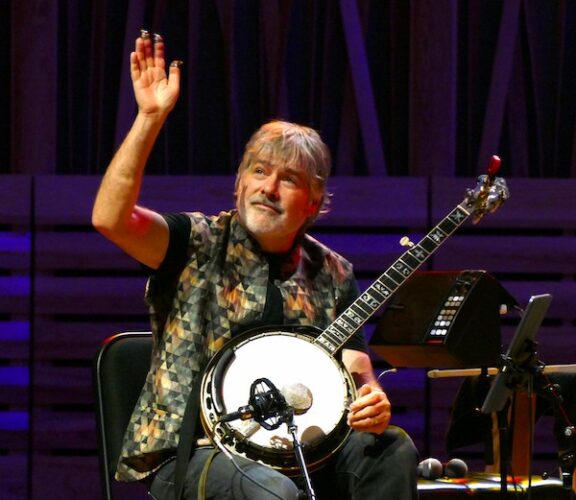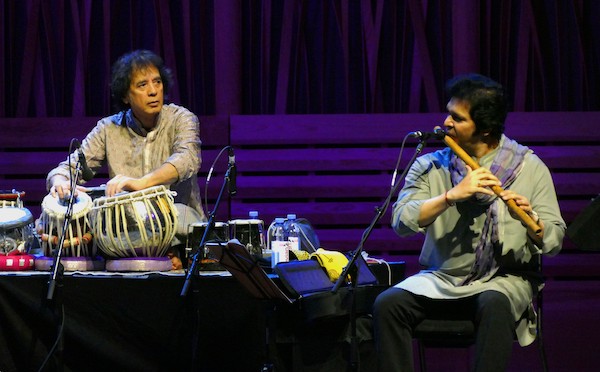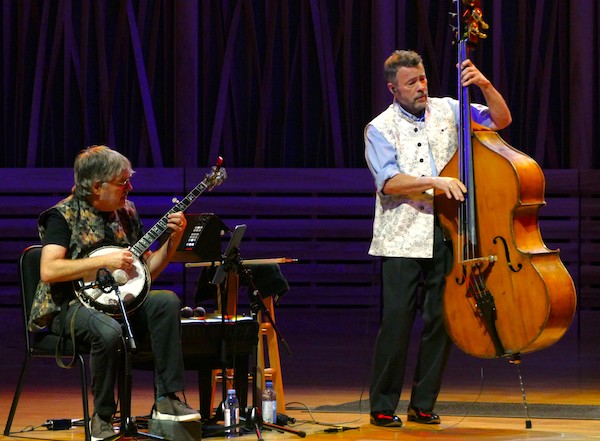Concert Review: Four Acclaimed Instrumentalists from Four Corners of the World Return to “As We Speak”
By Paul Robicheau
Four players bridged divergent worlds and styles from bluegrass and jazz to Indian and Western classical music while taking virtually no time to lock in together.
As We Speak, June 13 at the Groton Hill Music Center.

Béla Fleck at Groton Hill. Photo: Paul Robicheau
Four acclaimed instrumentalists came from different corners of the world to convene at the Groton Hill Music Center on Thursday and relearn the music from their 2023 album As We Speak for the first time since last November. Luckily, banjo innovator Béla Fleck told the full house, “It’s coming back.”
That was an understatement. Fleck sat next to acoustic bassist Edgar Meyer, a fellow cross-genre explorer he’s worked with since 1982, and they faced Indian masters in tabla virtuoso Zakir Hussain and bamboo flautist Rakesh Chaurasia on the stage of Groton’s magnificent concert hall. Yet the four players bridged divergent worlds and styles from bluegrass and jazz to Indian and Western classical music, while taking virtually no time to lock in together.
They warmed up with the joyous rhythms of opener “Bubbles,” but elements truly blended by their striking third piece, “J Bhai,” written by Hussain for his Shakti bandmate John McLaughlin. As bamboo-styled panels ringing the back of the stage adopted a reddish glow, Fleck engaged in call-and-response with Meyer’s bowed bass, then carved shared patterns with Hussain, who picked up the pace to an on-a-dime resolution that drew cheers from the audience.

Zakir Hussain and Rakesh Chaurasia at Groton Hill. Photo: Paul Robicheau
Fleck’s banjo naturally lacked the sustain of a guitar (like McLaughlin’s in the more dynamic Indian-rooted music of Shakti), as his crisp runs up and down the fretboard slipped into structural icing. Yet the novel instrumentation of the group struck its own distinctive balance. Meyer’s bass and Chaurasia’s bansuri flute lent rounded tones that countered the percussive nature of the banjo and tabla, which added low-end resonance from Hussain’s palm-rubbed inflections. The percussionist also supplied rhythmic Indian vocals to “Beast in the Garden,” gesturing to each bandmate to cue accents.
Throughout the concert, they all contributed to the melodies with nip-and-tuck efficiency. The four clearly shared an appreciation not only for each other’s musical gifts but each performer’s sense of humor, whether it was making faces waiting for Hussain while he tuned his drum with a hammer (later, even while playing) or joking when Fleck traded to a smaller banjo. “That’s what happens when you put your banjo in the dryer,” piped Hussain, to which Fleck countered, “Does this banjo make me look fat?”
That banjo lent an even more skeletal touch to Fleck’s lightly picked notes in “Pashto,” which rounded out a 55-minute first set with Chaurasia floating over Meyer’s bowed drone with bird-like cries on flute before the ensemble subtly gained steam in a locomotive sort of way.

Bela Fleck and Edgar Meyer at Groton Hill. Photo: Paul Robicheau
A second hourlong set took more liberties with tempo shifts. Hussain led that drive, from the sprightly circular melodies of “Owl’s Misfortune” to a playful conversation of tricky unison bars and pauses in “Rickety Karma,” which ended once again with an emphatic last deep note on his tabla drum.
Chaurasia began As We Speak’s title track with mournful calls from his larger bansuri flute, but he proved that what is primarily seen as an atmospheric instrument could exert a more forceful presence once that piece moved into what was arguably the highlight of the night. Chaurasia and Hussain engaged in a tour-de-force duet: they keenly mimicked each other’s lines before Hussian took off in a tabla solo that showcased his finger-tapping speed and precision as well as melodic sensibilities.
That fresh burst was hard to top. As the group wove more cyclical exchanges through closer “The B Tune” and the music crossed the two-hour mark with an encore of “1980” to complete the concert’s inclusion of all 12 tracks from As We Speak, nothing more needed to be said musically. Each piece of the puzzle served an impressive function, but the overall effect began to blur.
Paul Robicheau served more than 20 years as contributing editor for music at the Improper Bostonian in addition to writing and photography for the Boston Globe, Rolling Stone, and many other publications. He was also the founding arts editor of Boston Metro.
Tagged: Bela Fleck, Edgar Meyer, Groton Hill Music Center, Rakesh Chaurasia
